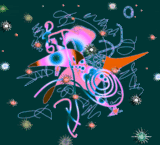
such sad news...hopefully the funding for and faith in science has not been completely dismayed.
experimental AIDS vaccine fails - volunteers infected
Los Angeles, CA - An experimental AIDS vaccine research trial has been terminated after recent findings that the drug has failed to prevent HIV infection in test subjects. According to a press release from the vaccine’s developer, Merck & Co., the vaccine was being tested in uninfected volunteers at high risk for acquiring HIV. Not only did the drug not prevent infection, but more inoculated volunteers contracted the virus than volunteers who were not inoculated.
Merck & Co. was co-sponsoring the trial with the HIV Vaccine Trials Network (HVTN), which is funded by the National Institute of Allergy and Infectious Diseases (NIAID), part of the U.S. National Institutes of Health (NIH). After an interim analysis of the research study, study investigators have been instructed to discontinue vaccinating volunteers.
STEP, the name of the trial, enrolled 3,000 HIV-negative volunteers from diverse backgrounds between 18 and 45 years of age at high risk of HIV infection. Research on the vaccine included multiple clinical trial sites in North and South America, the Caribbean and Australia. The first volunteer enrolled in the study in December 2004, and enrollment was completed in March 2007. A second Phase II trial of the vaccine, the Phambili trial, was begun in 2007 in South Africa. According to a report by the Associated Press, enrollment and vaccination in that trial and two other Phase I trials have been discontinued.
Many of the participants in the trial were gay men or female sex workers. According to the Bay Area Reporter Online, 137 gay and bisexual men from the city were enrolled in the Phase II trial. The San Francisco Health Department’s HIV research section began contacting the volunteers on Friday to inform them of the halting of the research trial.
"I was surprised. No one anticipated this response. This vaccine had shown a good immune response in prior trials," Gavin Morrow-Hall, a community educator with the research section who helped recruit participants for the trial, told the Bay Area Reporter. "The vaccinations will not continue, but we still hope to see our study participants because there is still a lot of information we can learn about the vaccine."
The vaccine was composed of a weakened version of a common cold virus, which delivered three synthetically produced genes from the AIDS virus. The theory behind the vaccine was that the synthetic genes would stimulate T-cells in the body to provide a higher immune protection against the HIV virus. Those infected with HIV who have strong T-cell response tend to do better than those who do not.
The study aimed to test whether the vaccine prevented HIV infection in participants and whether the vaccine reduced the amount of the virus in those who did develop an infection. Out of 741 volunteers who received the vaccine, 24 of them became infected with the HIV virus. In the 762 volunteers who received a placebo, 21 cases of HIV infection were reported. For those who received the vaccine after being infected with HIV, the drug did not reduce the amount of virus in the bloodstream of the volunteers. According to Merck, volunteers were provided with counseling on reducing their risk of HIV infection during the trial.
"We share in the disappointment of the research and HIV communities today. Sadly, developing an effective AIDS vaccine remains one of the most challenging tasks facing modern medicine," said Peter S. Kim, Ph.D., president, Merck Research Laboratories. "Merck's 20-year HIV research program has led to improved scientific understanding of HIV and to true breakthrough medicines. We are committed to studying the data closely and sharing it with the scientific community to inform the on-going search for an effective HIV vaccine."
"Today's announcement about the STEP Study is a deep disappointment and a scientific setback for the AIDS vaccine field,” the AIDS Vaccine Advocacy Coalition (AVAC) said in a release. “However, it must be seen for what it is: the failure of a product to show efficacy in a specific trial. Clinical testing of AIDS vaccines is a scientific process and, while this is a disappointment, it is in no way the end of the search for an AIDS vaccine.
Volunteers in the study were followed for approximately 13 months and additional analyses will be conducted on the participants in the study.











1 comments:
Source: http://www.sciencedaily.com/releases/2007/10/071012080135.htm
Science Daily — The search for a vaccination against HIV has been in progress since 1984, with very little success. Traditional methods used for identifying potential cellular targets can be very costly and time-consuming.
The key to creating a vaccination lies in knowing which parts of the pathogen to target with which antibodies. A new study by David Heckerman and colleagues from Massachusetts General Hospital, publishing in PLoS Computational Biology, has come up with a way to match pathogens to their antibodies.
At the core of the human immune response is the train-to-kill mechanism in which specialized immune cells are sensitized to recognize small peptides from foreign pathogens (e.g., HIV). Following this sensitization, these cells are then activated to kill cells that display this same peptide. However, for sensitization and killing to occur, the pathogen peptide must be "paired up" with one of the infected person's other specialized immune molecules--an HLA (human leukocyte antigen) molecule. The way in which pathogen peptides interact with these HLA molecules defines if and how an immune response will be generated.
Heckerman's model uses ELISpot assays to identify HLA-restricted epitopes, and which HLA alleles are responsible for which reactions towards which pathogens. The data generated about the immune response to pathogens fills in missing information from previous studies, and can be used to solve a variety of similar problems.
The model was applied to data from donors with HIV, and made 12 correct predictions out of 16. This study, says David Heckerman, has "significant implications for the understanding of...vaccine development." The statistical approach is unusual in the study of HLA molecules, and could lead the way to developing an HIV vaccine.
Citation: Listgarten J, Frahm N, Kadie C, Brander C, Heckerman D (2007) A statistical framework for modeling HLA-dependent T cell response data. PLoS Comput Biol 3(10): e188. doi:10.1371/journal.pcbi.0030188
Note: This story has been adapted from material provided by Public Library of Science.
Fausto Intilla
www.oloscience.com
Post a Comment